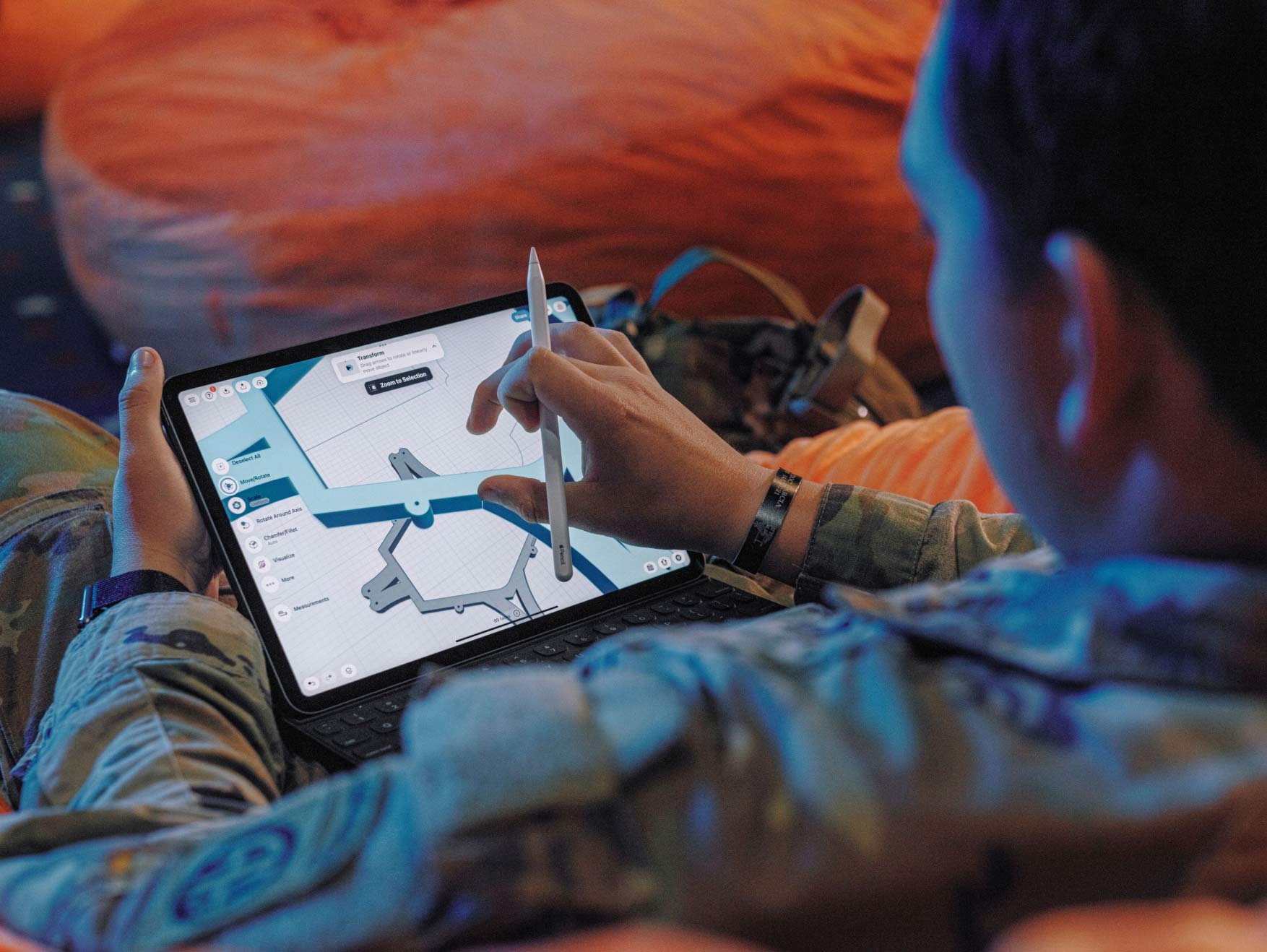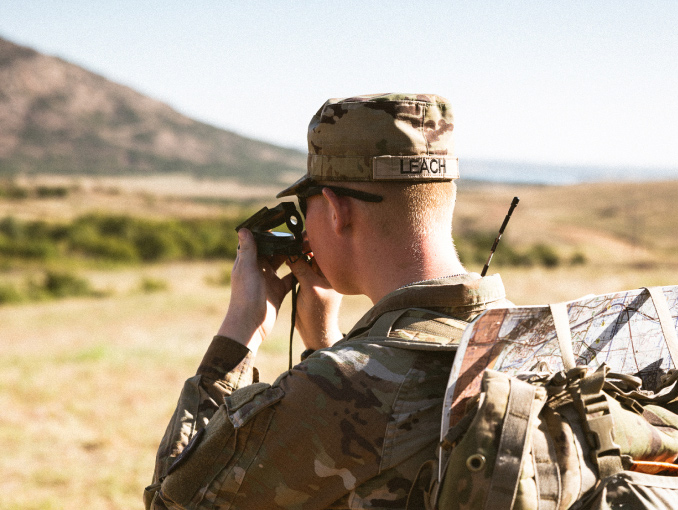Advanced Individual Training
Go from new Soldier to skilled pro.
Train for your Army career at Advanced Individual Training (AIT) schools, where you’ll build the technical skills needed to become an expert in your specific Army job and beyond.

Become
Become
A True
A True
Expert.
Expert.
Find the right training for your career field.
As an enlisted Soldier you’ll be assigned to a specific AIT school based on your Army job, which also determines the length of time you’ll need to attend.

SCIENCE & MEDICINE
Chemical, Biological, Radiological, Nuclear School
Chemical, Biological, Radiological, Nuclear School
Become an expert in defense technology against chemical, biological, radiological, and nuclear threats. You’ll learn skills within the chemistry and biology fields, along with detection and decontamination.
Support & Logistics
Adjutant General School
Adjutant General School
Study personnel management, business administration, and performance management. You’ll learn skills very similar to what an office manager or a human resource professional in a corporation might learn.
Financial Management School
Financial Management School
Study finance, accounting, and procurement along with telecommunications and computers. You’ll learn how to manage finances for travel, transportation, and commercial vendor vouchers.
Quartermaster School
Quartermaster School
Study large-scale logistics while collecting and analyzing data plus planning and scheduling. You’ll learn the fundamentals of providing Soldiers with basic necessities during a military or relief operation.
Signal & Intelligence
U.S. Army Intelligence Center
U.S. Army Intelligence Center
Become an expert in intelligence by studying foreign communications, translating, and reporting. You’ll learn to collect intelligence from human subjects through interviews while gathering and analyzing intelligence from digital sources.
Signal Corps School
Signal Corps School
Become knowledgeable in informational systems, communications systems, and worldwide networks. You’ll learn skills like signals and technology.
Aviation & Aerial Defense
Air Defense Artillery (ADA) School
Air Defense Artillery (ADA) School
Become an expert in air defense by understanding radar operations and systems. You’ll learn how to use the systems that protect U.S. forces from aerial attack, missile attack, and enemy surveillance.
Aviation Logistics School
Aviation Logistics School
Become an expert in aircraft mechanics with skills like aviation operations and aerial support. You’ll learn how to keep the Army’s fleet of rotary aircraft in top operating condition.
Mechanics & Engineering
Engineer School
Engineer School
Become an expert in engineering. You’ll learn engineering skills like construction, bridge building, structural maintenance, and electrical repair.
Ordnance Mechanical Maintenance School
Ordnance Mechanical Maintenance School
Become an expert in weapon systems, vehicles, and tactical support equipment. You’ll learn electronic troubleshooting along with how to perform mechanical and electrical maintenance.
Ordnance Munitions and Electronics Maintenance School
Ordnance Munitions and Electronics Maintenance School
Become an expert in explosives by understanding how to repair and maintain electronic systems, ammunition systems, and missile systems. You’ll learn how to disarm explosive devices.
Ground Forces
Department of Defense Fire Academy
Department of Defense Fire Academy
Become an expert firefighter by studying fire protection fundamentals and fire alarm communications. You’ll learn all of the techniques used to fight fires both in the military and civilian worlds.
Military Police School
Military Police School
Become an expert in law enforcement by studying intelligence collection and security. You’ll learn policing tactics for war, peace, stability operations, and civil support operations.
Transportation School
Transportation School
Become an expert in transportation by understanding vehicle operations along with electronics and hydraulics. You’ll learn how to operate and maintain Army tactical trucks, material handling equipment, and watercraft.
U.S. Army Armor School
U.S. Army Armor School
Become an expert in weapons operations and combat operations involving tanks or tracked vehicles. You’ll learn the fundamentals of armor and defense.
Field Artillery School
Field Artillery School
Become an expert in combat operations with knowledge about weapons operations as well as detection and destruction. You’ll learn to operate a variety of electronics and communications platforms.
Infantry School
Infantry School
Become an expert in small arms, anti-armor, or indirect fire weapons. You’ll learn the fundamentals of weapons operation and maintenance, vehicle operation and maintenance, and land reconnaissance.
Explore all jobs.
TRAIN FOR SPECIALIZED CAREERS.
Some Soldiers want to advance their careers even further, and applying to a specialized school within the Army is an opportunity to do that. If you meet the right criteria for acceptance, you can focus your training in a specialized field.
-
Defense Information School
-
Defense Language Institute

Take the first step.
Find out more about becoming a Soldier and if a career in the Army is right for you.
Common questions about Advanced Individual Training.
Not finding what you need?
Chat with us any time.
Which Advanced Individual Training (AIT) school will I attend? How long will it be?
Which Advanced Individual Training (AIT) school will I attend? How long will it be?
Your Army job determines which school you’ll attend and for how long. There are 17 different AIT schools in areas ranging from transportation to aviation, and you’ll be sent to the school that specializes in your assigned job. AIT can last between four to 52 weeks, depending on the skills you’ll need to develop before reporting to duty. Visit Army Career Match to get started.
What happens after AIT?
What happens after AIT?
After you successfully complete the requirements of AIT, you’ll graduate from your school and be given a short break, typically 10 days, before you join your unit and officially begin work.
Do you get paid during AIT?
Do you get paid during AIT?
Yes, you do get paid during AIT, on the first and fifteenth of every month. The amount of money and pay you’ll earn depends on your rank.
Is there a break between Basic Training and AIT?
Is there a break between Basic Training and AIT?
No. In most cases, you’ll be given a few days to travel between your Basic Training location and Advanced Training location, but this isn’t considered an official break. If you attend One Station Unit Training, you won’t receive travel time because your Basic Training and AIT will be held on the same base.
Is there a chance I could do Basic Training and AIT at the same time?
Is there a chance I could do Basic Training and AIT at the same time?
Yes. Infantry and Armor Soldiers attend a training program called One Station Unit Training (OSUT). OSUT combines Basic Training with AIT and is held at the same base, so you won’t need to travel in between and you’ll only have one graduation.